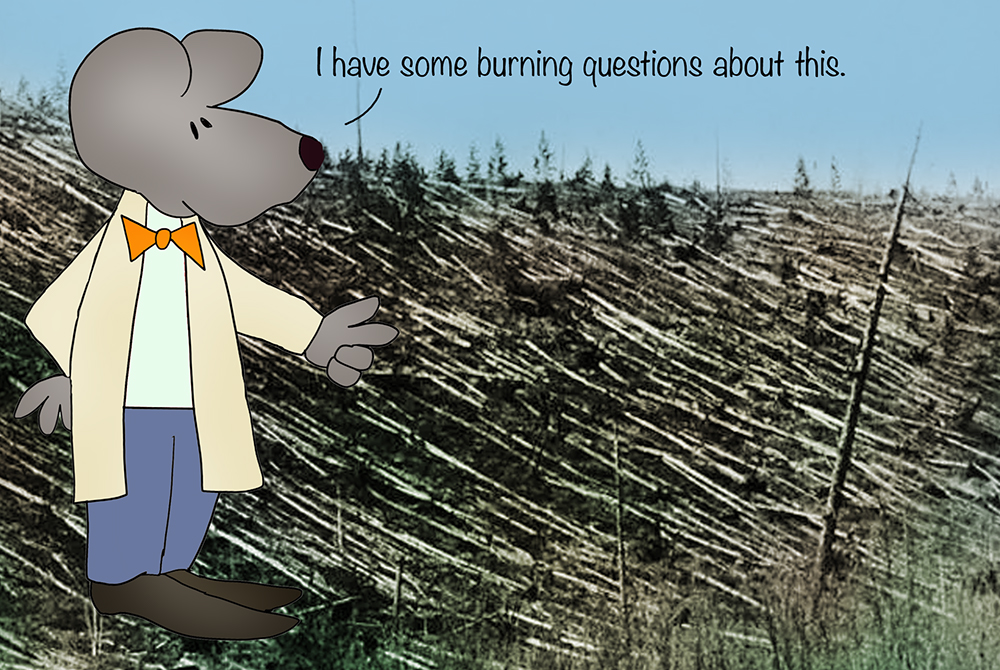Sometimes the skies from above open up and surprise us. In a wide range of ways and experiences.
But on the morning of June 30, 1908, while a bunch of good Russians were eating their bowls of Post Toasties, something of gargantuan proportions did happen in their sky.
A massive “fireball” came crashing down to earth, the largest “impact” event on Earth in our recorded history.
It became known as “The Tunguska Fireball” and “The Tunguska Event.”
First of all, this was in a very remote part of Russia. Extremely. The exact location sounds like a bunch of Russian to me, but here it is: Near the Podkamennaya Tunguska River in Yeniseysk Governorate (now Krasnoyarsk Krai), Russia.
Eastern Siberia, if that helps. But as you look at a map of Russia, and imagine it is a big beaver lying on its side, it is about where the belly button would be, if beavers have belly buttons. And now that I say it, that might be a good thing for me to explore sometime. But not actually in the wild. As I am sure, there aren’t a whole lot of beavers who would let me look at their would-be-belly-buttons.
Anyway. Back to Russia.
There was a large explosion. And when I say large, I mean bigger than Paul Bunyan large. It flattened an estimated 80 million trees over an area of 2,150 km2 — that’s 830 square miles of forest. Some perspective here? New York City is 320 square miles. Washington D.C. is 68 square miles.
They say — at least they think — the explosion was caused when there was an “air burst” of a stony meteoroid about 100 meters (328 feet) in size (the length of a football field). That is one big rock hurtling toward earth. The scientists back then classified it as an impact event. But they never found a crater. They figured the object disintegrated at an altitude of about 5 miles into the air, rather than to have hit the surface of the Earth.
The explosion registered at seismic stations across Eurasia. And “airwaves” from the blast were detected in Germany, Denmark, Croatia, the United Kingdom, and as far away as Batavia, Dutch East Indies, and Washington, D.C. Again, a big stinking blast.
An eyewitness account (Wikipedia).
According to the testimony of S. Semenov, as recorded by Russian mineralogist Leonid Kulik’s expedition in 1930:
At breakfast time I was sitting by the house at Vanavara Trading Post [approximately 65 kilometres (40 mi) south of the explosion], facing north. […] I suddenly saw that directly to the north, over Onkoul’s Tunguska Road, the sky split in two and fire appeared high and wide over the forest [as Semenov showed, about 50 degrees up—expedition note]. The split in the sky grew larger, and the entire northern side was covered with fire. At that moment I became so hot that I couldn’t bear it as if my shirt was on fire; from the northern side, where the fire was, came strong heat. I wanted to tear off my shirt and throw it down, but then the sky shut closed, and a strong thump sounded, and I was thrown a few metres. I lost my senses for a moment, but then my wife ran out and led me to the house. After that such noise came, as if rocks were falling or cannons were firing, the Earth shook, and when I was on the ground, I pressed my head down, fearing rocks would smash it. When the sky opened up, hot wind raced between the houses, like from cannons, which left traces in the ground like pathways, and it damaged some crops. Later we saw that many windows were shattered, and in the barn, a part of the iron lock snapped.
This was the first time I’ve ever heard of the great fireball, this meteor coming down to earth. If it had struck a populated area, the results would have been much different. We simply never know.
Now I have something else to worry about in 2020.
===========
The most beautiful gift of nature is that it gives one pleasure to look around and try to comprehend what we see.
— Albert Einstein
===========
We don’t inherit the earth from our ancestors, we borrow it from our children.
— Native American proverb
===========
Nature never hurries. Atom by atom, little by little, she achieves her work.
— Ralph Waldo Emerson
===========
A big ball of burning sky
